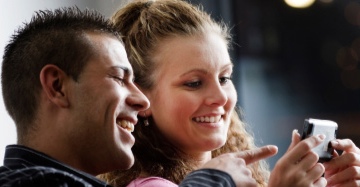 More and more brands are realising the importance of consumer engagement and are taking positive steps to address it. Both experiential marketing techniques and the boom in social media provide valuable mechanisms for brands to exploit in engaging their consumers making them akin to a married couple where the whole is greater than the sum of its parts.
More and more brands are realising the importance of consumer engagement and are taking positive steps to address it. Both experiential marketing techniques and the boom in social media provide valuable mechanisms for brands to exploit in engaging their consumers making them akin to a married couple where the whole is greater than the sum of its parts.
Experiential marketing and social media are on the up
Engagement communication in on the increase and more and more brands are seeing its value. If this is the case, why are more brands not embracing the opportunity of linking experiential marketing and social media together as one?
Social media is taking over more and more ATL marketing budgets due to its ability to create two-way conversations, but like every new media, it is becoming congested with more and more brands occupying the space making it harder to break through the clutter and stand out.
Let’s face the facts – brand owners want to tell their brand story to as many people as possible to create an action or outcome. With the right strategic planning and execution, experiential marketing and social media can help solve business challenges. According to London School of Economics, increasing positive brand responses by 7% can lead to a bottom-line increase of 1%.
Experiential marketing is about creating experiences and two-way interactions that emotionally connect with people, resulting in memorability of brand and product. In 2007 it was been ranked as the number one medium most likely to result in purchase (Jack Morton, 2006; Experiential Marketing Study: A Survey of Global Response) due to the deep-set emotional connection it helps to form – and that was in the days before social media began dominating marketing budgets! In the modern climate, with dynamic communications booming, the need for the two mediums amplifying each other to create a greater ROI is simply a necessity.
Experiential marketing and social media share a lot of common qualities in how they are able to engage with a consumer with the only real difference between the two being the channel of delivery. Marrying them together successfully requires planning to use the right measures at the right time along with the right messages, for example, pre-promotion of an event, digital content creation from an event itself, or post-event conversation.
Respect and likability
Brands like and respect experiential marketing due to its ability to add value to people’s day by giving them a valuable experience, which inspires people to to take an action – our research has indicated that 67% of people will try a brand because of an experience.
Similarly, the world-wide explosion of social media and social networks shows how much enjoyment people get out of these convenient, easy to use and dynamic environments. Over 3 billion photos are uploaded to Facebook every month while 5 billion pieces of content are shared every week!
Breaking through the clutter
Social media extends far beyond the tools which facilitate it such as Facebook and twitter. Social media consultant Richard Stacy says, “Broadband internet access and the tools of what is being called social media mean that it now costs nothing to distribute information to a mass audience. Information has been separated from its means of distribution and it is now free in both a liberty sense as well as a monetary sense.”
Social media can be strategically married with experiential marketing to produce incredible results. When we worked with telecoms brand Powwownow, we integrated social media in to the campaign to allow people to interact with celebrities at the event. By utilising Facebook, Twitter and a live interactive video-streaming microsite, we were able to get people sharing and talking to both our celebrities and their friends. The result? A total event reach of over 17 million people.
The beauty of this new medium, as many other experiential marketing have highlighted, is that it can work “organically”. If your experience is remarkable enough, people will talk about it online (as well as off) of their own accord, because they want to, and not because you have directly targeted and engaged them.
It works the other way round too…
We have begun to see examples of brand experiences being used to amplify social media activity. Recently, Heineken wanted to celebrate their one millionth ‘like’ on Facebook so they sent a branded “hug team” out in to Amsterdam to thank the people that drank their beer. This was interesting in a three of ways. Firstly, the fact they activated an event to celebrate shows the value the brand now places on social media. Secondly, they realised that online activity needs to be made relevant to consumers and the only way a brand can ever do this is through giving people real-life experiences. Finally, Heineken used the event to create digital content in the form of a video. Somewhat inevitable, the resulting content became viral via social media again, completing a fascinating life-cycle.
Why are people not embracing this relationship?
If experiential marketing and social media are a perfect marriage, why are more brands not making themselves familiar more with this couple?! What are the main barriers to linking experiential marketing and social media together?
Here are four possibilities:
Brands don’t know how to make them work together
The perception is that it is cheaper to use one without the other
It all seems too complicated
“Everyone else is doing it this way so why should we change?”
Are brand owners not sure which agencies to choose or is using social media still seen by upper management as a new way to distribute a TV advert?
Marketing environments are constantly changing and the companies keeping up to date with where and how consumer communication are leading the marketing debate.
Experiential marketing and social media are a perfect marriage – they work best together. Their common ground gives them a good foundation on which to build a strong, complementary relationship that can see brand messages amplified to huge effect, meaning the whole is greater than the sum of its parts.
You need to choose your partner carefully and wisely to create a successful relationship and integrating experiential marketing and social media is no exception. Precise strategic planning is required to break through barriers that prevent brand owners utilising the two mediums in a marriage made in heaven where each medium amplifies the other.
For more information or a free consultation about how to integrate experiential marketing and social media to help your brand, contact us.
Hotcow is a multi-award winning brand engagement agency specialising in experiential marketing. Our mission is simple: to help brands understand the power of “experience-based marketing” and offer expertise in how to develop, plan and execute campaigns in the right way to get the right results, while showing that every pound spent is measurable. Visit www.hotcow.co.uk for more information.
